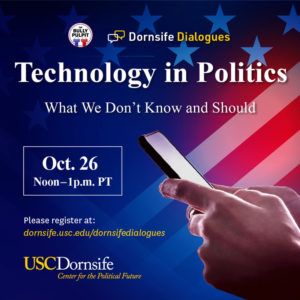October 26, 2021 @ 12:00 pm - 1:00 pm PDT
Technology in Politics: What We Don’t Know and Should
USC Center for the Political Future
Location: Online
The use of technology in politics – from social media to smart phones to targeted internet adversiting – has become more sophisticated and widespread. As its prevalence expands, so does the number of questions about its use and value, and its impacts on politics and civil society.
How are current technologies being used in politics? What are the benefits of those technologies? What are the pitfalls? How can users know if these technologies adequately protect our privacy and security? In turn, how do privacy laws affect these technologies?
What about people who use far less technology because of their age or lack of resources? Are they being fairly and accurately represented in politics as the use of technology increases?
Is the net effect of these technologies improving U.S. politics or being used to drive Americans further apart? How much are social media platforms radicalizing people? How do these technologies affect voter suppression?
Get answers to these and related questions during this energized discussion among a host of noted experts.
Featuring:
Morteza Dehgani – associate professor of pyschology, USC Dornsife
Katie Harbath – founder and CEO of Anchor Change; former public policy director for global elections at Facebook
Cheryl Hori – founder and chief strategist, Pacific Campaign House
John Patzakis – executive chair and chief legal officer, X1
Bob Shrum (Moderator) – director, USC Dornsife Center for the Political Future; Carmen H. and Louis Warschaw Chair in Practical Politics and professor of the practice of political science, USC Dornsife
Mike Murphy (Moderator) – co-director, USC Dornsife Center for the Political Future; NBC Political Analyst
This conversation is part of our Bully Pulpit podcast series. When President Theodore Roosevelt coined the phrase bully pulpit, bully meant “wonderful;” and Roosevelt, according to the Oxford Dictionary, was envisioning “an outstanding opportunity to speak out on any issue.” Every exchange is guided by standards central to the Center’s mission: Respect each other and respect the truth. Opponents are adversaries, not enemies. And if you lose, don’t burn down the stadium.


